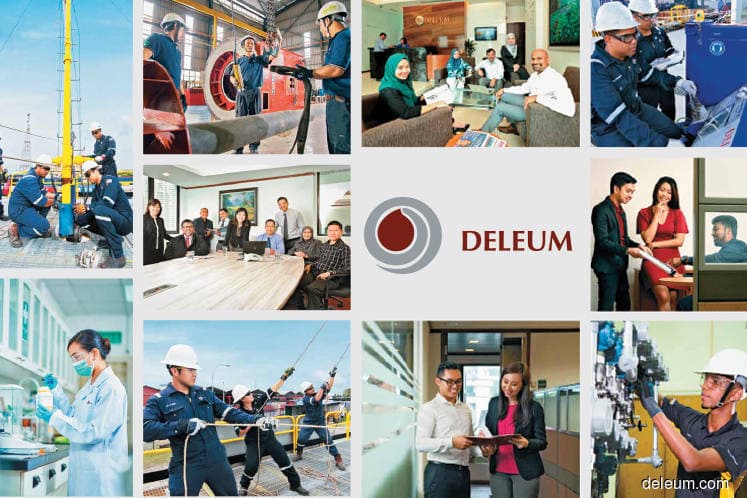
This article first appeared in The Edge Malaysia Weekly on November 27, 2017 - December 3, 2017
WHEN oil and gas company Deleum Bhd announced to Bursa Malaysia that its 60% unit, Deleum Primera Sdn Bhd, had been awarded a maintenance, construction and modification (MCM) contract for gas structures in Peninsular Malaysia by Petronas Carigali Sdn Bhd last month, there was some agitation in the industry.
One oil and gas executive explains that Petroliam Nasional Bhd (Petronas) — which wholly owns Petronas Carigali — usually awards jobs only to companies with a proven track record.
The value of the contract was not disclosed.
However, industry players reckon it to be anywhere between RM750 million and RM1 billion, which explains the trepidation, as large contracts have been hard to come by since oil prices tumbled in 2014.
Deleum managing director Nan Yusri Nan Rahimy dismisses the notion that Deleum does not have the requisite expertise. “What we are doing now is just an extension of what we have done before. It’s nothing new, it’s just an extension,” he tells The Edge in an exclusive interview.
“This kind of work (MCM) has been here since oil and gas was established … since Miri in the 1900s. The work is maintenance. It’s an ongoing thing, it’s not something new.”
Nan Yusri highlights that Deleum, via Deleum Primera, had been awarded two painting and alternative blasting contracts by Petronas Carigali in end-2014 and extension contracts for the same jobs in October last year.
He says while undertaking the painting and blasting jobs, Deleum had supported topside maintenance players Petra Energy Bhd, Dayang Enterprise Holdings Bhd and Carimin Petroleum Bhd, which helped build Deleum’s capability for the current MCM award. “It’s just a normal progression. People say Deleum is a new player, but we planned this five years ago.”
Blasting and painting — which Deleum has undertaken successfully — are both elements of MCM, with the others being the marine spread, facility improvement and topside maintenance (TSM).
For the marine spread, Deleum formed a working relationship with Icon Offshore Bhd, a government-linked company that has a fleet of 32 vessels, ranging from utility boats and accommodation work barges to anchor handling tugs and supply ships.
“We took note of Petronas’ efforts in consolidation and project collaboration, so we may be looking at the other local players to support us ... not doing everything on our own,” says Nan Yusri.
“We have the relevant licences and we are already in the game, maybe not totally, but we already have the team. We have done the jobs before, we have supported the TSM players and now we are taking the lead. Yes, we do believe we have the expertise, and now the work starts. It’s how we squeeze the margins and run it effectively and efficiently.”
Judging by Deleum Primera’s financials, the profit margins seem to be razor thin. To put things in perspective, for its year ended December 2015, Deleum Primera posted an after-tax profit of RM958,283 on revenue of RM45.58 million, which indicates a margin of roughly 2.1%.
Considering the MCM contract is for five years, with a one-year option for extension, Deleum’s annual revenue should be anywhere from RM150 million to RM200 million, if the industry players’ estimated contract value is correct.
For its nine months ended September 2017, Deleum raked in RM18.82 million in net profit from RM364.21 million in sales. When annualised, this would indicate the company registering a net profit of RM25.09 million from RM485.61 million in sales.
While margins are not as great as they used to be, Nan Yusri says he terms the MCM contract a material development, which indicates at least a 10% increase in profits.
“Contracts like this (MCM) are very volume-based. It’s a volume business rather than a margin business. It’s how you manage your costs, how you manage the project effectively and efficiently,” he explains.
Nevertheless, Deleum’s shareholders can hope for better dividends. Deleum has a policy of paying out at least 50% of its net profits as dividends. At its close of 96 sen last Friday, the company had a gross dividend yield of 3.39% and a market capitalisation of RM384.2 million.
“We are paying dividends in these tough times. We are one of the few companies in a net cash position,” Nan Yusri says.
As at end-September, Deleum had cash and bank balances of RM136.67 million, long-term debt commitments of RM49.49 million and short-term borrowings of RM36.9 million.
Save by subscribing to us for your print and/or digital copy.
P/S: The Edge is also available on Apple's AppStore and Androids' Google Play.